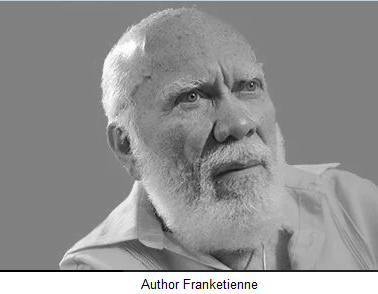Ardain Isma
CSMS Magazine
The passing of Frankétienne marks the end of an era for Haitian literature. More than just an author, he was a literary revolutionary, a guardian of culture, and a fearless voice that echoed through Haiti’s tumultuous history. His legacy is not just in the words he wrote but in the impact he had on the Haitian identity, both within the country and across the world.
I had the privilege of meeting Frankétienne in Nantes, France, in the spring of 2015 while visiting as part of an official delegation from Jacksonville, Florida. Our group was there to participate in the Floralies, a trade show showcasing floral displays, crafts, and industry products and services. The event was organized by Johanna Rolland, the city’s mayor, a member of the Socialist Party, and an environmental activist dedicated to making Nantes a greener city.
Frankétienne, however, was there for a different reason. He had come to honor the memory of the millions of Africans forced into slavery, as Nantes was a key transit point during the Atlantic slave trade. He was accompanied by French activist Christine Renard, one of the event’s organizers. It was a profoundly moving and unforgettable moment.
A Literary Visionary Who Defied Boundaries
Frankétienne’s genius lay in his ability to blend language, history, and political resistance. As one of the founders of Spiralism—a movement that sought to represent Haiti’s chaotic, cyclical reality—he crafted literature that transcended conventional storytelling. His most celebrated novel, Dézafi, was groundbreaking as the first full-length novel written in Haitian Creole. In doing so, he elevated a language that had long been relegated to the margins of intellectual discourse, giving voice to the very people who had historically been silenced.
His works were not merely artistic expressions; they were acts of defiance. Under the oppressive Duvalier regime, Frankétienne wielded words as weapons, crafting narratives that mirrored the struggles of the Haitian people. His fearless approach made him a symbol of intellectual resistance, inspiring generations of writers and activists alike.
The Cultural Guardian of Haiti
Haiti is often viewed through the narrow lens of political instability and poverty. Frankétienne, however, painted a broader, richer picture. Through his poetry, plays, and paintings, he showcased the depth of Haitian culture—its folklore, its rhythms, its struggles, and its triumphs. His artistry was not just about aesthetics; it was about preservation. He understood that a nation’s identity is deeply rooted in its art, and he dedicated his life to ensuring that Haiti’s soul was never lost amid its hardships.
Beyond literature, Frankétienne was an advocate for Creole as a legitimate literary language. In a country where French has historically been associated with power and prestige, his insistence on writing in Creole was revolutionary. By doing so, he empowered generations of Haitians to embrace their linguistic heritage with pride.
Why Frankétienne’s Work Matters Today
Frankétienne’s passing leaves an irreplaceable void, but his work remains as relevant as ever. In an era where language and identity are battlegrounds for cultural recognition, his contributions serve as a blueprint for how literature can be both a reflection and a tool for change. His life’s work underscores the importance of storytelling in shaping national consciousness and fostering global understanding.
As Haiti continues to navigate political and social challenges, it is crucial to revisit Frankétienne’s works, not just as literature but as guides to resilience and self-determination. His stories remind us that Haiti is more than its struggles—it is a land of poets, artists, and revolutionaries whose voices deserve to be heard.
Frankétienne may no longer be with us, but his words live on, whispering through the streets of Port-au-Prince, carried in the melodies of Creole poetry, and etched in the soul of Haitian literature.
 Note: Ardain Isma is the Chief-Editor of CSMS Magazine. He is the author of several books, including Midnight at Noon, Bittersweet Memories of Last Spring, and Last Spring was Bittersweet. You can order these books by clicking on the links above.
Note: Ardain Isma is the Chief-Editor of CSMS Magazine. He is the author of several books, including Midnight at Noon, Bittersweet Memories of Last Spring, and Last Spring was Bittersweet. You can order these books by clicking on the links above.


